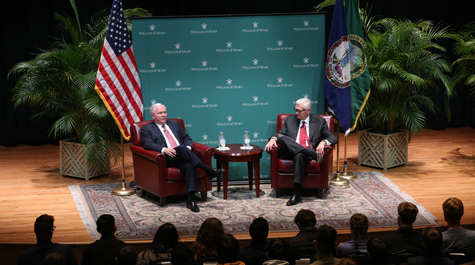When College of William and Mary Chancellor Robert Gates ’65 took the stage of Commonwealth Auditorium the evening of Feb. 8 to discuss the national political climate, he had one resounding message — that he was optimistic about the future, and others should be too.
The former secretary of defense joined College President Taylor Reveley to celebrate Charter Day with a question and answer session for the second year in a row. Like last year, the pair discussed potential threats to national security, current affairs and White House happenings.
Reveley began by saying that the United States seems to be locked in conflict and divisive politics, and followed by asking if Gates was optimistic about the future. Gates said that he was optimistic, primarily because he has confidence in young people entering the workforce. Gates said that one thing he would like to see more of from these young people is volunteer work, particularly once they have graduated college.
Next, Reveley dove into asking about potential threats to national security. Reveley asked Gates how he thought the United States should respond to the threat posed by North Korea. Gates, who served under former President George W. Bush and former President Barack Obama, said that he believed Kim Jong-un was coming from a reasonable place.
Additionally, Gates said that he does not believe the United States can “give North Korea a bloody nose” without facing retaliation. For this reason, he said he has mostly seen civilians arguing for military action while those in the military advise proceeding with caution.
“The dirty little secret in Washington is the biggest doves wear uniforms, because they’ve been there and they know what the consequences are,” Gates said.
“The dirty little secret in Washington is the biggest doves wear uniforms, because they’ve been there and they know what the consequences are,” Gates said. “They’ve seen the blood and they’ve seen the gore. They’ve seen innocent civilians killed. And anybody who does not think that is not an inherent part of war has not been there and does not understand.”
When an audience member asked Gates if global warming should be considered a threat, he said that while it doesn’t pose a threat now, it will pose a threat in the future in two ways.
According to Gates, it poses a threat for the future in how it impacts developing countries in terms of poverty and disease. He also said it could be seen as a threat in how there are many military facilities that are built on the coast, which one day could be in jeopardy due to sea-level rise.
Reveley also asked Gates about immigration, something Gates has discussed before in the context of the armed forces. Gates said that he believed most people supported the Deferred Action for Childhood Arrivals policy and that he would support further legislation to protect those students protected under DACA.
“All the kids are really vulnerable … the long term solution was to throw it to Congress and make it legal … but politicians don’t take into account the impact on the young people and their families of the uncertainty,” Gates said.
“All the kids are really vulnerable … the long term solution was to throw it to Congress and make it legal … but politicians don’t take into account the impact on the young people and their families of the uncertainty,” Gates said.
After Reveley finished asking questions, the floor was opened to audience members to ask questions. One individual asked Gates what he thought potential opportunities and risks associated with technology and artificial intelligence were.
Gates said that though he is not the most well-versed in technology, he believes people should not be afraid of the technology itself. To him, technology is not a concern as long as ethically-minded humans are at the forefront of technological development.
Another audience member asked Gates questions about the future of the Kurdish independence movement, and what role the United States should play. He said that there are many nation-states threatened by Kurdish independence, so he would like to see Iraq evolve into a federal structure that gives more autonomy to the Kurds as opposed to seeing the Kurds continue to drive for independence through military action.
One audience member, Adam Kearney ’20, asked Gates what he thought should be done about China’s encroachment into the South China Sea.
Gates said that he believes the United States hasn’t figured out a strategy to deal with this aggression, and noted a difference between freedom of navigation and innocent passage.
“Instead of having freedom of navigation, we did innocent passage,” Gates said. “That’s where you go through territorial waters of a sovereign state as a passenger ship, freedom of navigation treats it as international water. We didn’t do this for the first years, but we finally did a freedom exercise at the end [of Obama’s presidency]. We see a mix with this administration. We are now at a point where I don’t think we really have a strategy.”
Kearney’s question was reflective of his academic interests — he attended the question and answer session, he said, because he is a government major and wanted to learn from Gates about international affairs, politics and foreign affairs.
“I learned a lot for sure,” Kearney said. “I wouldn’t say there is any one takeaway for me, just I have a general broader understanding of international affairs and defense politics specifically.”

